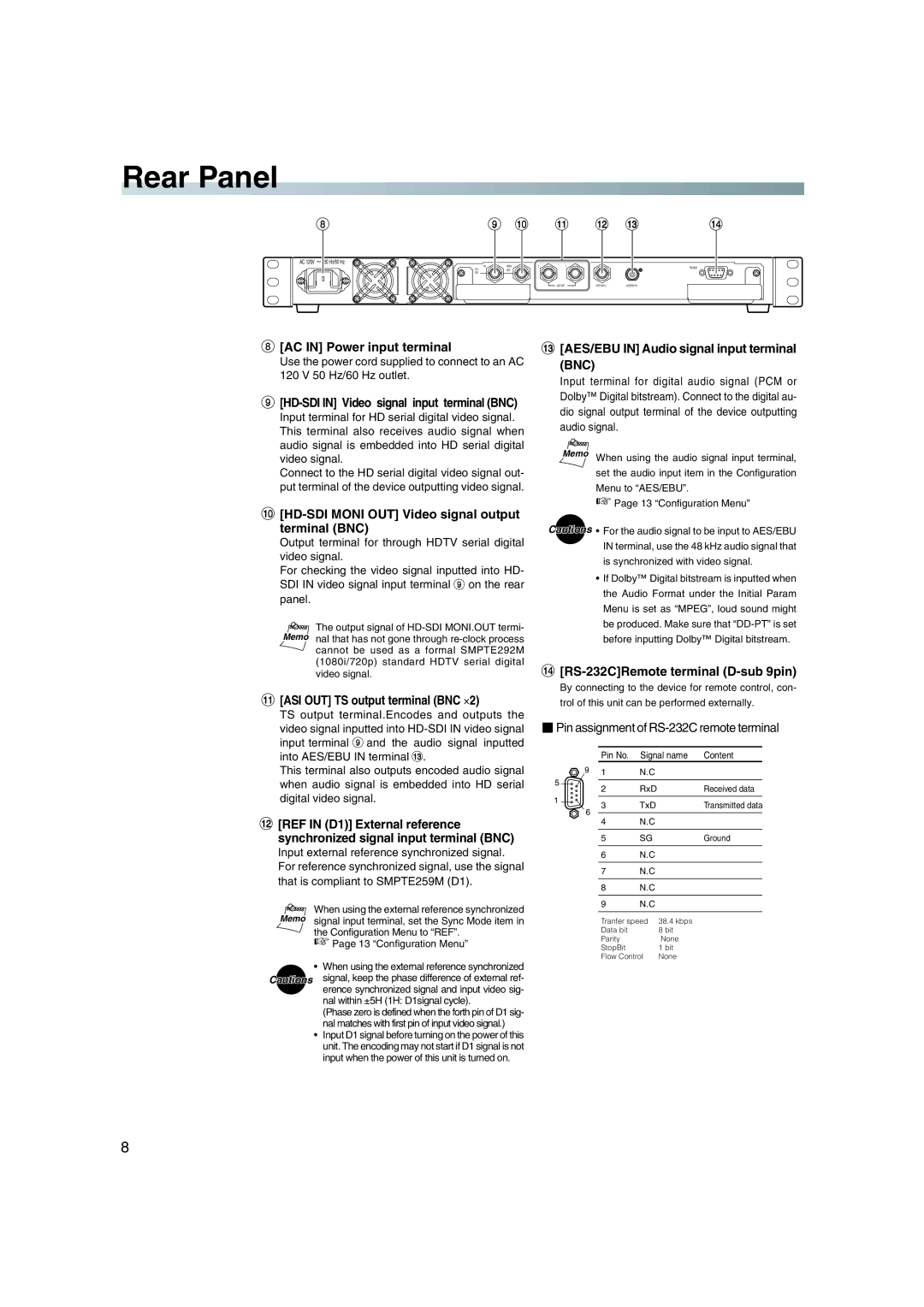
Rear Panel
8 | 9 | 0 | ! | @ | # | $ |
AC 120V ~ 50 Hz/60 Hz |
| 2 | 1 |
|
|
|
IN | MONI |
|
| |||
HD- | OUT |
|
|
|
| |
|
|
|
|
| ||
SDI |
|
|
|
|
|
|
ASI OUT | REF IN(D1) | AES/EBU IN |
|
|
|
8[AC IN] Power input terminal
Use the power cord supplied to connect to an AC 120 V 50 Hz/60 Hz outlet.
9[HD-SDI IN] Video signal input terminal (BNC)
Input terminal for HD serial digital video signal. This terminal also receives audio signal when audio signal is embedded into HD serial digital video signal.
Connect to the HD serial digital video signal out- put terminal of the device outputting video signal.
0[HD-SDI MONI OUT] Video signal output terminal (BNC)
Output terminal for through HDTV serial digital video signal.
For checking the video signal inputted into HD- SDI IN video signal input terminal 9 on the rear panel.
![]() The output signal of
The output signal of
video signal.
![ASI OUT] TS output terminal (BNC ⋅2)
TS output terminal.Encodes and outputs the video signal inputted into
This terminal also outputs encoded audio signal when audio signal is embedded into HD serial digital video signal.
@[REF IN (D1)] External reference synchronized signal input terminal (BNC)
Input external reference synchronized signal. For reference synchronized signal, use the signal that is compliant to SMPTE259M (D1).
![]() When using the external reference synchronized Memo signal input terminal, set the Sync Mode item in
When using the external reference synchronized Memo signal input terminal, set the Sync Mode item in
the Configuration Menu to “REF”.
☞Page 13 “Configuration Menu”
#[AES/EBU IN] Audio signal input terminal (BNC)
Input terminal for digital audio signal (PCM or Dolby™ Digital bitstream). Connect to the digital au- dio signal output terminal of the device outputting audio signal.
Memo When using the audio signal input terminal, set the audio input item in the Configuration Menu to “AES/EBU”.
☞Page 13 “Configuration Menu”
Cautions • For the audio signal to be input to AES/EBU IN terminal, use the 48 kHz audio signal that is synchronized with video signal.
•If Dolby™ Digital bitstream is inputted when the Audio Format under the Initial Param Menu is set as “MPEG”, loud sound might be produced. Make sure that
$[RS-232C]Remote terminal (D-sub 9pin)
By connecting to the device for remote control, con-
trol of this unit can be performed externally.
Pin assignment of RS-232C remote terminal
| Pin No. | Signal name | Content | |
| 9 1 | N.C |
|
|
5 | 2 | RxD |
| Received data |
|
| |||
1 | 3 | TxD |
| Transmitted data |
|
| |||
| 6 |
|
|
|
| 4 | N.C |
|
|
| 5 | SG |
| Ground |
| 6 | N.C |
|
|
| 7 | N.C |
|
|
| 8 | N.C |
|
|
| 9 | N.C |
|
|
| Tranfer speed | 38.4 kbps |
| |
| Data bit |
| 8 bit |
|
| Parity |
| None |
|
| StopBit |
| 1 bit |
|
| Flow Control | None |
| |
• When using the external reference synchronized
Cautions signal, keep the phase difference of external ref- erence synchronized signal and input video sig-
nal within ±5H (1H: D1signal cycle).
(Phase zero is defined when the forth pin of D1 sig- nal matches with first pin of input video signal.)
•Input D1 signal before turning on the power of this unit. The encoding may not start if D1 signal is not input when the power of this unit is turned on.
8
